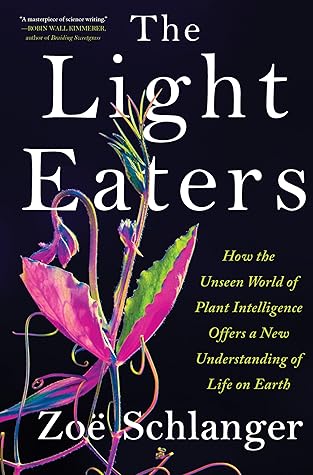More on this book
Community
Kindle Notes & Highlights
Read between
March 18 - June 2, 2025
All biology, I began to understand, is in fact ecology. Ecosystem dynamics that ecologists study apply just as easily to single plants themselves.
Emanuele Coccia wrote that plants exist in a state of total “immersion.” Immersion is an action of “compenetration,” he wrote, a word that means pervasive, mutual interfusion.
In plants, “to act and to be acted upon are formally indistinguishable,” Coccia wrote. “If the environment does not begin beyond the skin of the living being, this is because the world is already inside it.”
To exist, for plants, means to reciprocally construct the world. The world is inside them.
The idea that everything is interconnected came through like a powerful chime. Everything is quite literally interconnected. The evidence is us.
those genetic changes could be passed down to their children, and their children’s children, even if those later generations had moved away and were no longer exposed to the pollution. This is a very bleak example of human epigenetics—the ways our specific environment can modify the way our genes work, and how those changes can be passed to our offspring, their offspring, and so on.
to not lose sight of its fundamental architecture, which is truly that of a community of creatures responding to changes in their world. Everything, at every level of life from a microbe to a rain forest, then, is an ecosystem. We are more like a system than a single unit. All biology is ecology.
Our environment shapes our lives and the lives of our descendants. We inherit their environment in bodily form. One could say we inherit the earth.
A fingernail-sized root fragment left behind can regenerate the entire plant.
A soft thing without eyes or a mouth that applies sustained pressure to our hard boundaries, the only thing between us and the dirt, and it wins the fight? That’s unsettling to a sense of order bent on the supremacy of human ingenuity. The possibility that we are not in charge flicks through the mind. Power is a matter of perspective.
Agency is an organism’s capacity to assess the conditions it finds itself in, and change itself to suit them. Yes, we do this all the time. So do plants.
Mechanistic visions of being controlled only by our preprogrammed genes do not satisfy our innate understanding of ourselves as brimming with irreducible complexity and subtlety.
We too are like plants, taking in information from outside our skin, the membrane separating us only bar...
This highlight has been truncated due to consecutive passage length restrictions.
Beneath the surface of every organism there is a vibrancy we do not know, yet, how to completely dissect or replicate. Complexity is mounting instead of receding. And that’s okay. It’s probably the truer directio...
This highlight has been truncated due to consecutive passage length restrictions.
“Mind” may be the result of interacting cells. Mind and body, perceiving and living, are equally self-referring, self-reflexive processes already present in the earliest bacteria. —LYNN MARGULIS AND DORION SAGAN,
General System Theory, a slim book by Ludwig von Bertalanffy, which outlined the idea that biology was in fact an agglomeration of systems or networks, which were all interconnected.
network theory.
A plant is an emergent system like that, Trewavas decided back then. They’re networks.
Thinking of plants as whole organisms led him to decide that plants are probably intelligent, and that intelligence is probably a property of all living things.* A brain is only one way to build a network, after all.
“We find it not easy to feel the system in which we actually live,” he says finally.
Every one is an unimaginable feat of luck and ingenuity. Once you know that, you can’t unknow it. A new moral pocket has opened in your mind.
Every inward breath of mine was first breathed out by plants.
The whole being a sensitive, decisioning network spread throughout hundreds of limbs, thousands of roots. A body in motion, adapting in real time to every subtle shift, flowing like water through its surroundings and taking note of the shape and smell and texture of it all.
I’ve brought them into the fold of animacy in my mind.
trying to use human language for plants “cheapens plants,” because it “assumes we are the ultimate being.” Instead, plants are far more advanced than humans in multiple categories.
the White Earth Band of Ojibwe gave the rice legal standing, recognizing its “inherent rights to exist, flourish, regenerate, and evolve.”
You might find you respect the autonomy of plants not because you know you “should,” but because you know you must. Because doing otherwise would violate your own moral personhood. It is a bridge to cross, from plant disregard to plant regard. The distance between the two is the orientation of one’s heart on the subject.
faithlessness in the public is a self-fulfilling prophecy. Remove complexity, and the capacity for complexity degrades farther.
The state of nature is one of interpenetration and mingling that defies easy categorization. It occupies a middle place, both in the material reality of the world and in our understanding of it. “The middle I speak of is not halfway between two poles; it is porousness that mocks the very idea of separation,” he writes. Akómoláfé outlines our collective biological reality as a state of “brilliant betweenness” that “defeats everything, corrodes every boundary, spills through marked territory, and crosses out every confident line.”
biotic creativity is our inheritance.
Biologically, their value lies in their function as members of interrelated communities, the rich, interspecific interactions that hold up the world, the one in which we are all a part.
A single plant is a marvel. A community of plants is life itself. It is the evolutionary past and future entangled into a riotous present in which we are ourselves also entangled. This stretches the mind. Plants give us the chance to see the system in which we live.


